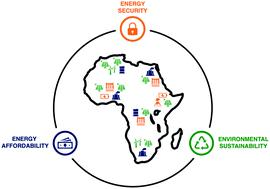当前位置:
X-MOL 学术
›
Energy Environ. Sci.
›
论文详情
Our official English website, www.x-mol.net, welcomes your
feedback! (Note: you will need to create a separate account there.)
Delivering low-carbon electricity systems in sub-Saharan Africa: insights from Nigeria
Energy & Environmental Science ( IF 32.4 ) Pub Date : 2021-5-19 , DOI: 10.1039/d1ee00746g Habiba Ahut Daggash 1, 2, 3, 4, 5 , Niall Mac Dowell 2, 3, 4, 5, 6
Energy & Environmental Science ( IF 32.4 ) Pub Date : 2021-5-19 , DOI: 10.1039/d1ee00746g Habiba Ahut Daggash 1, 2, 3, 4, 5 , Niall Mac Dowell 2, 3, 4, 5, 6
Affiliation

|
Sub-Saharan Africa (SSA) faces many challenges: two-thirds of the world's extreme poor population; a shrinking economy because of commodity price declines and the COVID-19 pandemic; widespread energy poverty; and climate variability that is disrupting agrarian livelihoods and stirring conflict over natural resources. Climate change threatens to exacerbate these through further disruption of the physical environment, and a transition away from the fossil fuels on which many of the region's economies depend. Through their nationally determined contributions (NDC) to the Paris Agreement, all SSA countries committed to the increased utilisation of intermittent renewable energy sources (IRES) to tackle the twin challenges of energy poverty—which limits economic development—and climate change. There is a dearth of analysis on the nature of sustainable energy transition(s) necessary to deliver these NDCs, especially given the limited financial and technical resources of SSA. Using Nigeria as a case study, this study seeks to address this gap by determining the power system transitions required to deliver NDCs alongside universal energy access in SSA by 2050; their financial and policy implications; and the barriers and opportunities that they present to sustainable development efforts. We find that Nigeria can deliver its NDCs with no added cost implications, thereby debunking the prevalent view that climate change mitigation is too costly to pursue in SSA. Furthermore, we find that the higher availability and dispatchability of fossil fuel generation makes it critical for the rapid scale-up of energy supply; thus, entirely leapfrogging carbon-intensive development will prove costly to SSA. Finally, owing to the limited cost reductions that IRES have experienced in SSA, delivering NDCs through the deployment of decentralised IRES systems proves more expensive than using conventional generation. The distributed nature of IRES however means that they can democratise energy investment and job creation, thus facilitating the equitable sharing of economic resources which is crucial to conflict prevention in the fragile socio-political landscapes that pervade the region.
中文翻译:

在撒哈拉以南非洲提供低碳电力系统:尼日利亚的见解
撒哈拉以南非洲(SSA)面临许多挑战:世界三分之二的极端贫困人口;由于商品价格下降和COVID-19大流行而导致的经济萎缩;普遍的能源贫困;气候变化正在破坏农业生计,激起了对自然资源的冲突。气候变化有可能通过物理环境的进一步破坏以及从该地区许多经济体所依赖的化石燃料的过渡而加剧这些问题。通过其对《巴黎协定》的国家决定性贡献(NDC),所有SSA国家都致力于增加间歇性可再生能源(IRES)的利用,以应对能源贫困(限制经济发展)和气候变化的双重挑战。缺乏对实现这些国家自主贡献所需的可持续能源转型本质的分析,尤其是在SSA的财政和技术资源有限的情况下。这项研究以尼日利亚为例,试图通过确定到2050年在SSA内交付NDC以及实现普遍能源获取所需的电力系统过渡来解决这一差距;其财务和政策影响;以及它们给可持续发展工作带来的障碍和机遇。我们发现,尼日利亚可以在不增加成本的情况下交付其国家数据中心,从而揭露了普遍的观点,即减缓气候变化的成本太高而无法在撒哈拉以南非洲进行。此外,我们发现化石燃料发电的更高可用性和可调度性使其对于迅速扩大能源供应至关重要。因此,完全跨越碳密集型发展将对SSA造成巨大损失。最后,由于IRES在SSA中降低的成本有限,因此,通过部署分散的IRES系统交付NDC比使用常规发电要昂贵得多。但是,IRES的分布式性质意味着它们可以使能源投资和创造就业机会民主化,从而促进经济资源的公平共享,这对于遍布该地区的脆弱的社会政治格局中的预防冲突至关重要。
更新日期:2021-05-25
中文翻译:

在撒哈拉以南非洲提供低碳电力系统:尼日利亚的见解
撒哈拉以南非洲(SSA)面临许多挑战:世界三分之二的极端贫困人口;由于商品价格下降和COVID-19大流行而导致的经济萎缩;普遍的能源贫困;气候变化正在破坏农业生计,激起了对自然资源的冲突。气候变化有可能通过物理环境的进一步破坏以及从该地区许多经济体所依赖的化石燃料的过渡而加剧这些问题。通过其对《巴黎协定》的国家决定性贡献(NDC),所有SSA国家都致力于增加间歇性可再生能源(IRES)的利用,以应对能源贫困(限制经济发展)和气候变化的双重挑战。缺乏对实现这些国家自主贡献所需的可持续能源转型本质的分析,尤其是在SSA的财政和技术资源有限的情况下。这项研究以尼日利亚为例,试图通过确定到2050年在SSA内交付NDC以及实现普遍能源获取所需的电力系统过渡来解决这一差距;其财务和政策影响;以及它们给可持续发展工作带来的障碍和机遇。我们发现,尼日利亚可以在不增加成本的情况下交付其国家数据中心,从而揭露了普遍的观点,即减缓气候变化的成本太高而无法在撒哈拉以南非洲进行。此外,我们发现化石燃料发电的更高可用性和可调度性使其对于迅速扩大能源供应至关重要。因此,完全跨越碳密集型发展将对SSA造成巨大损失。最后,由于IRES在SSA中降低的成本有限,因此,通过部署分散的IRES系统交付NDC比使用常规发电要昂贵得多。但是,IRES的分布式性质意味着它们可以使能源投资和创造就业机会民主化,从而促进经济资源的公平共享,这对于遍布该地区的脆弱的社会政治格局中的预防冲突至关重要。











































 京公网安备 11010802027423号
京公网安备 11010802027423号